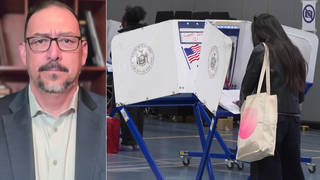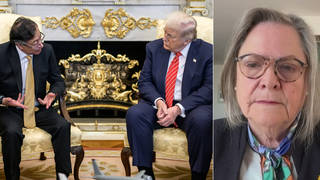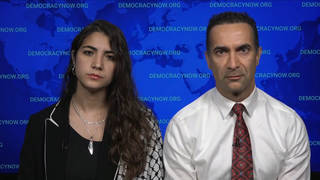
Guests
- Zehra Imamcommencement speaker for Harvard Divinity School, where she spoke out in support of Palestine.
It’s graduation season in the United States, and many brave students are taking the opportunity to demonstrate support for Palestinian rights despite an ongoing campus crackdown on pro-Palestine speech. We play excerpts from commencement and graduation addresses at MIT and Harvard and are joined by a student who spoke at Harvard Divinity School’s graduation ceremony. Zehra Imam, a Muslim associate chaplain at MIT, recounts the collaborative, interfaith process of writing her speech with Christian and Jewish classmates and explains why she decided to quote students from Gaza in her address. “This is a moment that calls for courage,” Imam says.
Transcript
AMY GOODMAN: This is Democracy Now!, democracynow.org. I’m Amy Goodman.
We end today’s show looking at the university protest movement nationwide as students deliver commencement speeches over the weekend, many focusing their remarks on denouncing Israel’s relentless war on Gaza and their university’s complicity in attempting to silence their voices. On Friday, the Indian American class president at MIT, the Massachusetts Institute of Technology, Megha Vemuri, was barred from attending her graduation ceremony, after she gave a commencement speech on Friday — on Thursday, when she wore a red-and-white keffiyeh and said MIT students would never support a genocide, praising them for continuing to protest despite quote, “threats, intimidation and suppression coming from all directions, especially,” she said, “your own university officials.” This is part of her speech.
MEGHA VEMURI: The Israeli occupation forces are the only foreign military that MIT has research ties with. This means that Israel’s assault on the Palestinian people is not only aided and abetted by our country, but our school. As scientists, engineers, academics and leaders, we have a commitment to support life, support aid efforts and call for an arms embargo and keep demanding now, as alumni, that MIT cuts the ties.
AMY GOODMAN: Meanwhile, at Harvard University, down the road in Cambridge, faculty joined students in calling for an end to Israel’s war on Gaza. This is professor of law Andrew Crespo addressing the 2025 Harvard Law School graduating class last week, commending students for standing up to the Trump administration’s crackdown on universities and education.
ANDREW MANUEL CRESPO: In an endless barrage, our government has tried to crush Harvard University, the very symbol of higher education in the world, and, more simply than that, our home. Our scientists and international students have been taken hostage, our research bankrupted, our community terrorized, all in an effort to try to change the way that we teach, the questions we ask and the answers we offer. From climate change to vaccines to the study of race and inequality in our country’s past and present, they want us to shut up, or, worse, they want us to say only what they want to hear. This, too, is what authoritarianism looks like. In the face of it, fear is rational, but courage is essential. And to your great credit, you, the class of 2025, have taught us time and again what true courage looks like.
AMY GOODMAN: Harvard Law School professor Andrew Crespo also criticized his own university’s response to the wave of pro-Palestine peaceful protests on campus.
ANDREW MANUEL CRESPO: We, your university, have not always learned well the lessons you were trying to teach. Harvard deserves praise for taking a stand to defend its academic independence. It is just as important for Harvard to use that independence to protect the academic freedoms, including the rights to study, publish, teach and, yes, protest of everyone on our campus without exception, especially when our messages are politically inconvenient. In this respect, whether in denying degrees to peaceful protesters or suspending hundreds of students and some teachers from our libraries, or firing the faculty directors of our Center for Middle Eastern Studies in what The New York Times called, quote-unquote, “an offering to the Trump administration,” I fear sometimes our university has too often exhibited acquiescence when courage was called for. Sooner rather than later, I am confident we will learn the lessons you tried to teach us, for our own sake and for the sake of this democracy.
AMY GOODMAN: Harvard Law professor Andrew Crespo was speaking after winning the 2025 Albert M. Sacks-Paul A. Freund Award for Teaching Excellence at Harvard. He was addressing the graduating class of the Harvard Law School.
In a minute, we’ll be joined by Zehra Imam, a new graduate of the Harvard Divinity School, where she delivered the commencement address last week. She’s also a Muslim associate chaplain at MIT. She spoke out in support of Palestine in her remarks.
ZEHRA IMAM: Class of 2025, Palestine is waiting for us to arrive. And you must be courageous enough to rise to the call, because Palestine will keep showing up in our living rooms until we are ready to meet its gaze.
AMY GOODMAN: Zehra Imam was wearing a keffiyeh on her head. She held a Palestinian flag as she addressed the commencement ceremony at Harvard Divinity School. Zehra Imam joins us now for more. She’s also a Muslim associate chaplain at MIT, just down the road.
Zehra, congratulations on your graduation from Harvard Divinity School. Can you elaborate on your comments?
ZEHRA IMAM: Yeah. First, thanks for having me on the show, Amy.
What I was talking about in my speech is the fact that this is a moment that calls for courage, not just on part of the student body, but the administration and all college campuses, beyond — Harvard and beyond. We are seeing that last year Alan Garber got booed at commencement, and this year he got a standing ovation for celebrating international students. But what if those international students are Palestinian, and they come to a place like Harvard, where, you know, I took a class called — on Israel-Palestine, and that class no longer exists at Harvard? I also went to Palestine through Harvard Divinity School. That program no longer exists at Harvard Divinity School. The three teachers who taught that class are no longer at Harvard. So, what kind of a place is Harvard for its Palestinian students who are coming in and for its pro-Palestinian students who are protesting at Harvard? So, that’s what I was calling attention to.
I was also calling attention to the fact that I have worked with students in Gaza who I was in conversation with as I was working on this speech, and they are living their history’s worst nightmares. And there are parts of the speech that I didn’t even put in that I want to share right now, which are that I felt truly that I’m in touch with the Anne Franks of our time, but we can still change the ending. And I say that because just yesterday I saw Anne Frank’s great cousin come on a video, and he called for the Jewish community, for the Germans or the international community to stop the war crimes that are happening and taking place in Gaza and all across Palestine. So, that’s what I was calling attention to in bringing up Palestine in my speech.
AMY GOODMAN: Zehra, you wrote your speech along with two other students, one Christian, the other Jewish? You are Muslim?
ZEHRA IMAM: Correct, and we each wrote our respective parts. We each gave input to one another. We had other students look over the speech. I personally not only brought in students from — I had a lot of quotes from students from Gaza that, you know, some I brought in, some I couldn’t. But I was in conversation. But, yeah, it was a group effort, not because we agreed with everything we were saying, but because it was important to be in solidarity with one another in a moment when the world is extremely divided. And I think we wanted to show what it means to be in community with one another. So, yeah.
AMY GOODMAN: So, let me ask you — you’re also an associate chaplain at MIT. I wanted to get your comment on the Indian American class president at MIT, Megha Vemuri, who was barred from attending her graduation ceremony after she gave a commencement speech the day before around Palestine. Your thoughts?
ZEHRA IMAM: I think Megha is incredibly brave, and as are all the students at MIT and on college campuses who are standing up for Palestine. Yeah, everything she said really speaks to the heart and soul of the student movements, which are going to be undeterred. And that was clear in her speech. Students will keep speaking up for Palestine and for liberation across college campuses. So, I am really proud of Megha for having — finding the right words and really being very courageous.
AMY GOODMAN: Well, I want to thank you for being with us. Did you get your diploma after you gave your commencement address, Zehra Imam?
ZEHRA IMAM: I did, you know, and I — so, I mean, I have it so far, so I don’t have any —
AMY GOODMAN: Well, even though Megha —
ZEHRA IMAM: — haven’t faced any challenges with that yet.
AMY GOODMAN: Even though Megha Vemuri was not allowed to attend her graduation, MIT did bestow upon her her diploma, unlike NYU, that took away the diploma of a young student who spoke out in his graduation address. That does it for our show. I’m Amy Goodman. Thanks so much for joining us.













Media Options